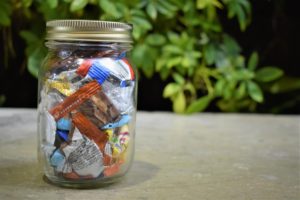by Charlotte Hings
Last week was Zero Waste Week here at the University of Waterloo, which encouraged students to be more aware of the waste they are producing and to take steps toward reducing their material footprints. To kick off Zero Waste Week, an open lecture was held on Monday that discussed many local and global waste challenges, hoping to inspire students to take action and join the Zero Waste Week Challenge.
Developed countries are centered around the high consumption of disposable products. There is a tremendous amount of waste that is created by affluent societies. In fact, the average North American produces about 4 pounds (1.7 kg) of trash per day. Much of this waste is plastic, a demon in disguise. In many respects, plastic can be seen as a very useful material in the manufacturing and packaging of various goods, due to its versatility, durability and light-weight. On the other hand, it is terrible for the environment as it is made from oil, a high-carbon fossil fuel. Oil is typically only used one time before it is thrown away, where it can then take hundreds of years to degrade once it reaches a landfill. While it degrades, it releases toxic chemicals into the soils, oceans, and freshwater systems, thus damaging ecosystems and harming those who depend on them.
In many Western societies, people have fallen victim to consumerism, and are obsessed with the accumulation of trivial material objects to prevent them from growing bored. This over-consumptive and material-driven society is fundamentally altering the earth system in ways that compromise our own well-being. This is why reducing consumption and waste at the individual level is so important.
The Zero Waste Challenge is designed for precisely this: to improve students’ waste consciousness and to encourage them to reduce their own personal material waste.
From Monday Oct. 15 to Friday Oct.19, students had the opportunity to partake in the challenge by registering online and were then encouraged to take the necessary steps to reduce their waste for the week such that it would fit in a 500 mL mason jar. Another feature of Zero Waste Week was the online Waste Quiz. It asked students questions to determine how knowledgeable they were of the various waste services on campus and at home, as well as how to properly dispose of different types of material waste products using these services.
The last feature of Zero Waste Week was the garbage mountain, which was located just outside the Davis Centre (DC). Here, all the garbage produced in DC throughout the week was accumulated, giving students a visual idea of the immense amount of waste produced on campus, hopefully encouraging them to take the necessary steps to reduce their personal waste.
Zero Waste Week may be over now, but this does not mean that efforts to reduce waste and to save the planet don’t need to be made. The main sources of waste can all be tackled with just five simple actions that can be done anytime:
- Shopping at bulk stores where you bring your own containers to fill with food products.
- Always having your own reusable coffee mug, water bottle, utensils and straws.
- Using reusable shopping bags and produce bags at the grocery store.
- Eating take-out/fast food less frequently.
- Using DIY/no waste alternatives for various hygiene and cleaning products such as toothpaste, dish soap and deodorant, which are easy to find online.





























